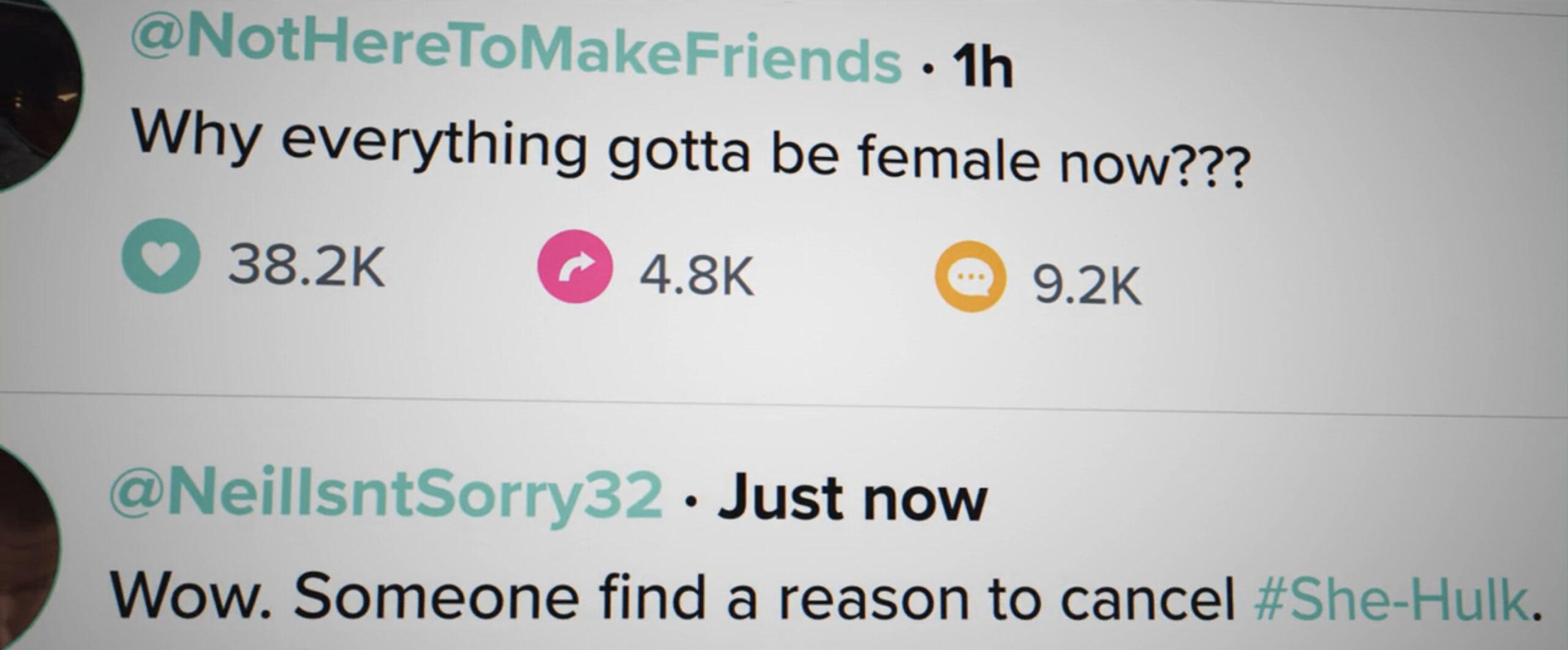In a number of ways, She-Hulk: Attorney at Law is unlike every project that preceded it in the Marvel Cinematic Universe—which is no small feat, considering we’re almost a decade and a half, and more than 30 combined movies and TV series, into the MCU’s existence. Although Phase 4 has been inconsistent and directionless as a whole (especially in comparison to Phase 3 and the conclusion of the Infinity Saga), this batch of films and TV shows has also made concerted efforts to reimagine and reconsider the MCU formula, from how these stories are told to the types of characters that they center. She-Hulk is Marvel Studios’ first sitcom, a series that devotes more attention to legal disputes and everyday life than it does the near world-ending catastrophes that we’ve become so accustomed to seeing in other MCU affairs. But even beyond the ways She-Hulk distinguishes itself by focusing on the ordinary moments in an extraordinary world, it also considers—and anticipates—the reactions of viewers streaming from home to an unprecedented degree.
Throughout Phase 4, Marvel’s on-screen projects, particularly on the TV side, have increasingly taken time to consider life in the MCU from a real-world perspective. The Falcon and the Winter Soldier took a more, let’s say, dramatic approach, framing its story and villains around the question of how the world would change after half its population disappeared and reappeared five years later. It also raised a mind-breaking question about how the Avengers were paid for their service. (Or, rather, how billionaire Tony Stark didn’t pay them.) Hawkeye featured a musical based on the Battle of New York, while Ms. Marvel held the first annual AvengerCon and focused its story on a teenager who’d grown up in a universe of superheroes. These developments are a logical next step in the evolution of the MCU, as the franchise’s history lengthens and its world and characters constantly evolve. But at times, these qualities blur the lines between the MCU and real-world fandom.
She-Hulk builds on this trend on multiple levels. The series fully introduces a “slice of life” approach to the MCU, forgoing a story about a superhero preventing another doomsday to instead consider, as head writer Jessica Gao put it, “what happens on a regular Tuesday when you just have to do laundry.” It introduces a wide array of obscure superhumans who are using their abilities to commit petty crimes rather than save the world, and no one is ever surprised by their powers because when half the universe can vanish at the snap of an alien’s fingers, why would you be? And going a step further than reducing the divide between the MCU and real-world fandom—as Ms. Marvel did when it introduced an in-universe version of Comic-Con—Jennifer Walters breaks down the fourth wall that separates them, just as the character has in the comics since the 1980s. More than that, She-Hulk has framed its entire first season around the idea of toxic fandom itself.
Over the course of the season, She-Hulk has played with the double standards and misogyny that a career woman like Jen may face in her work as a lawyer, while also applying that commentary to the more rarefied field of superheroes. The most direct and conspicuous manifestation of this approach occurred in the third episode, as She-Hulk endured a backlash on social media and in news segments after taking on Emil Blonsky’s case and emerging as a public figure. The on-screen backlash looked a lot like some of the actual reactions and responses that the Disney+ series has sparked, which the writers anticipated in 2019 when the show was only just starting to come together.

“It just goes to show how completely unoriginal and tired and boring these guys are, that three years ago, we could predict exactly what they were gonna say,” Gao said on a recent episode of the X-Ray Vision podcast. “Like, fucking get a new song, man! … It is specific to the show, but it also isn’t; that type of hate and stupidity is not specific to this show only. It’s so prevalent that that’s why we were able to just know exactly. It was very funny when the show premiered seeing all the responses, where I was like, ‘Heh heh heh, you just wait ’til the third episode comes out.’ ’Cause the little troll inside of me was also giggling.”
In fact, it appears that some of those on-screen comments from the third episode were pulled from actual comments on Instagram when the series was first announced in 2019. As Gao points out, these toxic reactions to shows or movies with prominent female characters are far from new; the trolls have been even more brazen in instances involving women of color, from Star Wars to Ms. Marvel to The Little Mermaid. This behavior extends beyond the far-reaching fandoms of Disney-owned properties, as the pair of massive fantasy series airing concurrently with She-Hulk—House of the Dragon and The Lord of the Rings: The Rings of Power—are being met by the same cries about “wokeness” because of their casting choices. But the team behind She-Hulk was prepared for it, weaving in the expected responses from “hateful man-babies” as sources of humor and as a major component of Jen’s emotional journey to accepting both sides of her new, Hulk-smashing identity.
She-Hulk has gone as far as positioning the trolls as a collective, the Intelligencia, that serves as the main villain of the season. The group was introduced during last week’s episode, as Nikki and Mallory discovered the Reddit- and 4chan-like online forum that serves as a space for members to shit-talk She-Hulk and threaten her life. And during this week’s installment, “The Retreat,” we witness the lengths the Intelligencia has gone to to take her down, including sending in ostensible sweetheart Josh to pursue a sham relationship with Jen just so he can obtain a sample of her blood while she’s sleeping. (It isn’t as if Josh’s heel turn came as much of a surprise, but seven episodes in, She-Hulk’s most unconvincing subplot continues: Tatiana Maslany can’t find a guy who is attracted to her and doesn’t have the urge to kill her.)
The ways in which She-Hulk has incorporated and subverted the anticipated response by toxic fans have often been funny and clever—not to mention fascinating to watch unfold in real time, as the writers’ presentiments that they would have a need for “Twitter armor,” or that Jen would be hit with Shrek comparisons, have been borne out once the series got underway. (Granted, She-Hulk does kind of look like Fiona in her ogre state, so maybe anyone could’ve seen that one coming.) At the same time, the amount of attention paid to the most vocal and visible subset of “fans” has swelled to the point that it’s starting to monopolize the conversation around the series and distract from everything else occurring in Jen’s life as she becomes a full-fledged superhero. It also doesn’t help that some of the male characters, like Jen’s former colleague Dennis Bukowski, are written to be so overtly sexist that they seem like little more than caricatures compared to some of the more cutting ways in which the show has tackled these topics.
With the penultimate episode of the season coming next week, the leader of the Intelligencia has yet to be revealed, beyond the fact that they go by the username “HulkKing.” There are still any number of candidates from the comics; in addition to the two I proposed last week, M.O.D.O.K. and Awesome Andy, it could be the classic Hulk villain known as the Leader, auguring Tim Blake Nelson’s return to the MCU in Captain America: New World Order (after being sidelined since 2008’s The Incredible Hulk). Alternatively, it could be time for a Hulk to go red. There’s also an emerging theory that the mystery character may end up being none other than Todd, the rich and creepy dude who referred to Jen as a “specimen” on their first date, which might befit the show’s themes and scope more than a major villain who is already expected to appear in an upcoming movie.
Direct conflict with the Intelligencia seems imminent, so She-Hulk will no doubt continue to troll the trolls in its crusade against toxic fandom, whoever the villain turns out to be. With Jen’s blood in its possession, the group may soon spawn a figure like the Abomination—before Blonsky’s haikus and group therapy sessions—to square off against She-Hulk in the type of CGI slugfest that the MCU loves ending with. But if the final two episodes can keep the show’s heightened self-awareness intact, She-Hulk will toy with its audience’s expectations to the very end.

